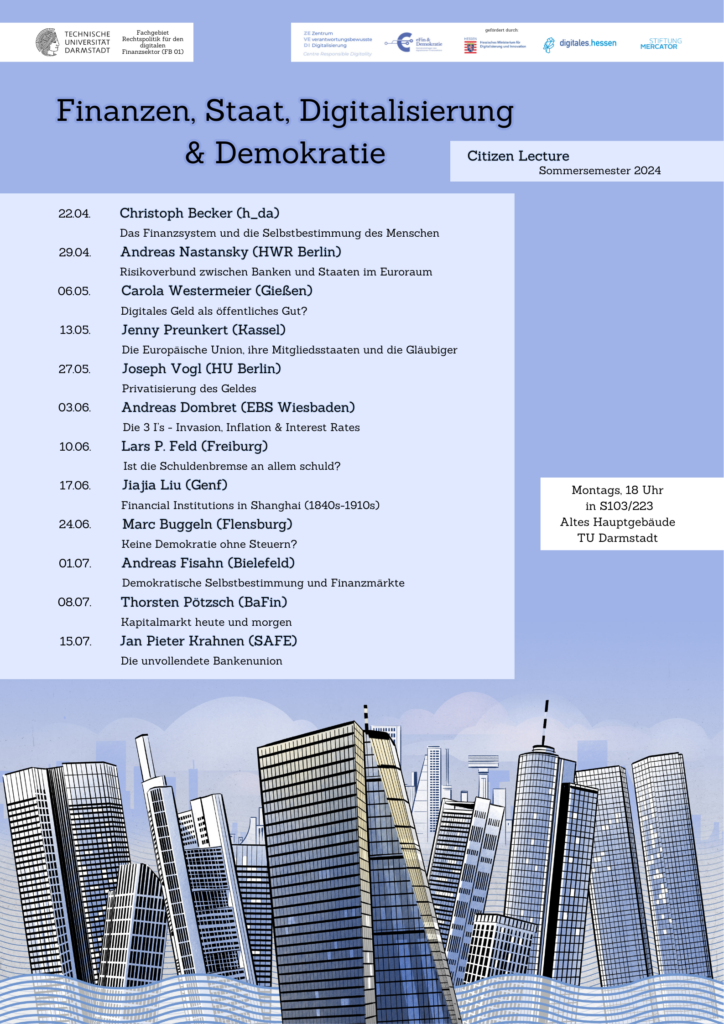Interdisciplinary Citizen Lecture
Every Monday, 18:00 CET, starting from 22 April 2024
Technische Universität Darmstadt, Old Main Building, Hochschulstr. 1, Lecture Hall 223
An Event of Faculty 01 (Law and Economics) in Cooperation with the Discourse Project Democratic Issues of the Digitalized Financial Sector at the Centre Responsible Digitality (ZEVEDI)
The relationship between the financial sector on the one hand and states, especially democracies, on the other is (re)constructed in different ways. Ideas about the the capital markets’ efficiency free them from demands for a “fair” distribution of financial resources. The “taming of the financial markets”, on the other hand, is a demand that was advocated by the movement critical of globalization in the 1990s. What both views have in common, however, is the implicit assumption that the market and the state are fundamentally separate. However, the dichotomy of market and state fails to recognize the entanglement of states and the financial world.
The genesis of modern statehood has led to a significant increase in the financial requirements of the public sector, which is only partially covered by taxes and fees. The state is therefore increasingly asking for loans or issuing bonds on the capital markets. It has also successively established central banks that act as lenders of last resort. It is therefore not only a demander, but also a major player on the capital markets. And it also shapes their framework conditions.
The expansion of the financial sector is linked both to the industrial revolution and the implementation of capitalist production methods as well as to increasing state activity. However, in order to reduce information asymmetries, protect the weak, strengthen the European single market or avoid further financial crises, the state often sets limits or imposes rules on financial intermediaries. Even more fundamentally, it can be stated that there is not a single financial product without a legal basis. No share, no bond, no loan and no derivative is born without legal norms. The question is therefore not one of market or state, but of the connections and ambivalences of the market-state relationship.
In a democracy – especially one in which digital technologies shape everyday life – the question of the role of the financial sector becomes even more pressing, as it is considered to be in need of regulation on the one hand and difficult to regulate on the other. In addition, the increased demand for capital can also lead to a certain dependence of the state on capital markets and thus make it more difficult to enforce democratic demands. The recent debate has also (re)raised the relationship between capital markets and distribution issues. In particular, this raises the question of how the conflicting goals of maximizing prosperity on the one hand and equitable distribution of economic goods on the other can be resolved. The third force in this area of conflict is the digital transformation, which is not just a “technical” issue. Under digital conditions, both capital markets and democracies are now fundamentally confronted with new requirements for communication, value creation and also the “traditional” understanding of currencies and payment systems.
The lecture series explores the ambivalent relationship between (digital) capital markets and (digital) democracy as well as the effects that evolving capital markets have on distribution issues. It reconstructs the history of capital markets and states as controversial as they were in earlier times and as they are today, on the one hand from the perspective of science, on the other hand it is also about a representation of facts and debates that is accessible to citizens. The lecture provides ways how to describe the issues at hand, raises the question of the objectives and means by which (digital) capital markets are (or should be) regulated and deals with the issues of prosperity and distributive justice in a digital world.
Programme
22.04.
Christoph Becker (Professor für Finanzmathematik und Stochastik, Darmstädter Institut für Statistik und Operations Research (DISO), h_da)
Das Finanzsystem und die Selbstbestimmung des Menschen
29.4.
Andreas Nastansky (Professor für Quantitative Methoden und Mathematik, HWR Berlin)
Risikoverbund zwischen Banken und Staaten im Euroraum
06.05.
Carola Westermeier (Akademische Rätin am Institut für Soziologie, Universität Gießen / aktuell ZEVEDI Young Investigator)
Digitales Geld als öffentliches Gut? Der digitale Euro als Finanz- und Sicherheitsinfrastruktur
13.05.
Jenny Preunkert (Professorin für Makrosoziologie, Universität Kassel)
Die Europäische Union, ihre Mitgliedsstaaten und die Gläubiger: Machtfigurationen auf den europäischen Kapitalmärkten
27.05.
Joseph Vogl (em. Professor für Literatur- und Kulturwissenschaft/Medien, HU Berlin)
Privatisierung des Geldes
03.06.
Andreas Dombret (Vorstand der Deutschen Bundesbank, a.D., Honararprofessor, EBS, Wiesbaden)
Die 3 I’s – Invasion, Inflation & Interest Rates
10.06.
Lars P. Feld (Professor für Wirtschaftspolitik, Universität Freiburg, Persönlicher Berater des Bundesfinanzministers)
Ist die Schuldenbremse an allem schuld? Für und Wider ihrer Reform
17.06.
Jiajia Liu (PostDoc Researcher, International History and Politics, Universität Genf)
Financial Institutions in Shanghai (1840s-1910s)
24.06.
Marc Buggeln (Professor für regionale Zeitgeschichte und PublicHistory & Direktor der Forschungsstelle für regionale Zeitgeschichte und Public History, Universität Flensburg)
Keine Demokratie ohne Steuern? Wandel der Gouvernementalität und soziale Gleichheit vom 18. Jahrhundert bis heute
01.07.
Andreas Fisahn (Professor für öffentliches Recht, Umwelt-und Technikrecht, Rechtstherie, Universität Bielefeld)
Demokratische Selbstbestimmung und Finanzmärkte
08.07.
Thorsten Pötzsch (Exekutivdirekor Geschäftsbereich Wertpapieraufsicht, Bundesanstalt für
Finanzdienstleistungsaufsicht (BaFin))
Kapitalmarkt heute und morgen
15.07.
Jan Pieter Krahnen (em. Professor für Kreditwirtschaft und Finanzierung & Gründungsdirektor des Leibniz-Instituts für Finanzmarktforschung SAFE, Frankfurt)
Die unvollendete Bankenunion: Europa im Spannungsfeld von Marktintegration und nationaler Souveränität

